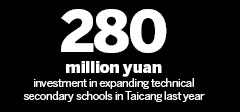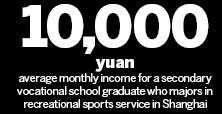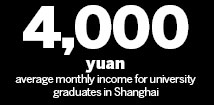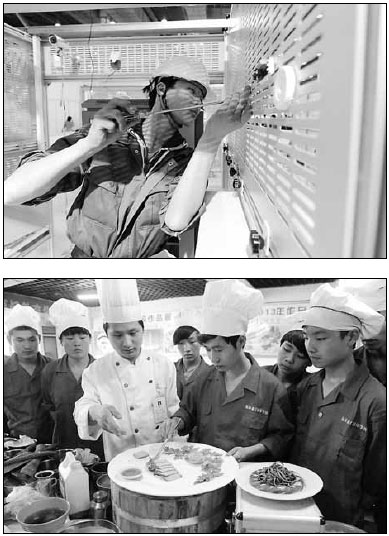The road to life after education
Updated: 2013-09-23 07:14
By Shi Jing and He Wei (China Daily)
|
||||||||
Shi Jing and He Wei in Shanghai contrast the prospects for vocational education graduates and those from colleges.
A slowing Chinese economy has fueled concern among many colleges for students' job prospects, but the principal of Chengdu Modern Vocational School has no such worries about her graduates.
July was a rewarding month for Chen Min, whose institute has registered a 100 percent employment rate for five consecutive years, with one-third of graduates securing one or more job offers six months before obtaining their diplomas.
On a typical humid summer afternoon in Chengdu, the fastest developing growth engine in western China, a group of apprentices, aged between 16 and 18, were starting a hairdressing journal, filled with jargon used in the trade.
By engaging them in heated discussion on the basic knowledge behind a certain hairstyle, Chen said the school is able to free students from a stereotyped, rigid curriculum, encourage them to "think outside the box" and to gain more hands-on experience in hair salons.
An education veteran, she has long seen vocational education's value in training skilled workers, tapping emerging-market needs and improving the employment rate.
By signing a Memorandum of Understanding with Northern Melbourne Institute (NMIT), one of Australia's leading vocational training institutes, Chen expects to take her school to the forefront of the vocational education arena, and for this model to benefit the vast majority in China.
The key to the partnership is to introduce internationally recognized courses to local students, and in the case of NMIT-Chengdu collaboration, it is the Technical and Further Education (TAFE) standard that is widely perceived as a prerequisite for qualified vocational training.
Dino Bettiol, executive director in charge of NMIT's international program, says the Chinese system for vocational education and training in upper secondary schools has great strengths - it builds on a robust basis of universal basic schooling and rapid growth in educational aspirations and attainment.
About 2,000 km east of Chengdu is Taicang in Jiangsu province, known for its complete vocational education system.
Zhou Xinyuan, president of Jiangsu Taicang Secondary Vocational School, said a graduate from his school who majored in recreational sports service and management landed a job in Shanghai in June managing fitness equipment in residential communities. Her after-tax salary is as much as 17,000 yuan ($2,765) a month, while the average for university graduates in Shanghai is just 4,000 yuan before tax.
"For students of this major, their salary is around 10,000 yuan a month. Once they graduate, they can easily find jobs," Zhou said.
The faster development of vocational education in Taicang has been boosted largely by more than 190 German companies in the city.
Known for its dual education system, Germany's economy has never been derailed, with the vocational education system guaranteeing jobs. A dual education system combines apprenticeships in a company and education at a vocational school in one course.
The dual education system was introduced to China by the central government in the 1980s, with schools under this system set up in cities including Shanghai, Nanjing, Tianjin, Weifang in Shandong province and Shiyan in Hubei province. But these attempts were initially plagued by a lack of proper training centers, the essence of the dual education system, Zhou said.
Local authorities stepped in and by 2007 there were 15 training centers working in collaboration with German companies and vocational schools in Taicang, all of them based in schools.

In July this year, Kern-Liebers, a manufacturer of springs and components for textile machines, based in the German town of Schramberg, set up a 800 square meter training center at its plant in Taicang so that students could be placed in a real-plant environment and learn things more easily.
"We considered all the possibilities to allow the students to grow up in a real-plant environment," Zhou said.
The dual education system can also be found at the Chien-Shiung Institute of Technology in Taicang. Established in 2004, the school received initial investment of 900 million yuan, with an additional 500 million yuan last year to expand its training center sixfold.
All the students under the dual education system are offered jobs by German companies based locally long before graduation.
Wei Xiaofeng, president of the institute, said: "It is now kind of ridiculous to see that migrant workers land jobs easily, while university graduates are left jobless. This is largely a consequence of a structural deficit in the educational system. We see few university graduates mastering the required skills or techniques."

But he said the situation can be changed in places where the economy is developed sufficiently to have an influence on the educational system. In other words, companies can customize the kind of students they need and so change the entire educational system.
"This will do much good for the upgrading and restructuring of the manufacturing industry," he said.
To ensure graduates meet the demands of companies, Chien-Shiung places higher requirements on its teachers. They must have the required teaching qualifications and also be experienced technicians. At present, about one-tenth of Chien-Shiung's teachers have worked overseas.
Of Chien-Shiung's first 17 graduates under the dual education system, half have become technical directors with their companies. Wang Fang, one of them, was promoted from technical worker to workshop director after two years with Schaeffler Holding (China) in Taicang.
"I think graduates from Chien-Shiung are more promising in terms of career development," she said.
Wang Bo graduated from Chien-Shiung last year. Although he received job offers from German companies, he chose to return to his father's firm in Suzhou, which has made electric converters for more than 40 years.

"I chose to study at Chien-Shiung especially because I am a huge fan of machines and large equipment. I am not too much of an academic person. What I have learned at school can be really useful in my father's factory," he said.
Wang Yonglin, a standing committee member of the Taicang City Committee of the Communist Party of China, says vocational education in the city should become the template for the nation.
While many people still think vocational school graduates are those unable to get enrolled at universities, this perception has changed in Taicang. More than 50 percent of the junior high school graduates choose to go to vocational schooling, while less than 50 percent go to high schools.
Young people in Taicang are willing to go to vocational schools largely because there is no barrier between these schools and colleges. About 10 percent of the technical secondary school graduates will continue to pursue their studies at colleges. The local education authorities have also cooperated with Tongji University in Shanghai so that students can complete their education at a higher level.
Wang said: "Vocational education does not indicate an end period - as can be seen in Germany. We should bring the same system here to China so that students will be more willing to go to vocational schools. The ultimate goal of pursuing whatever kind of study is to ensure employment, which vocational education in Taicang can do."
A total of 250 million yuan was invested to expand technical secondary schools in Taicang in 2011 and the figure rose to 280 million yuan last year.
In 2000, traditional industries in Jiangsu province began to transform into emerging industries.
"The trend has become even more noticeable since 2008, as economic growth slowed and exports shrank. The local authorities have realized that labor-intensive industries have lost their competitive edge and are attaching more importance to tech-savvy industries, which have higher demands on talent," Wang said.
The courses at local vocational schools are changing accordingly. Biochemical, logistics, port management, business outsourcing and even cultural and creative industry courses can now be found on the timetables of vocational schools in Taicang.
Zhou Hongbin, director of Taicang Education Bureau, said: "Vocational education in Taicang is very much tailored to its industrial restructuring. For higher vocational education, more importance is now attached to cultural and creative industries, while the central government is making great efforts to nurture industries such as animation.
"Attempts in other cities that turned out to be failures can largely be attributed to less attention from the government. This kind of cooperation between companies and schools must be initiated and led by the local government," he added.
Contact the writers at shijing@chinadaily.com.cn and hewei@chinadaily.com.cn

|
Top: Students prepare for a flight attendant exercise during a professional skills competition for vocational schools in Shanghai. Middle: A student fixes a security alarm during the annual competition, in which more than 4,000 students from the city's 72 vocational schools took part. Above: Students learn how to make Chinese cold dishes at a privately owned vocational school for chefs in Fuyang, Anhui province. Wang Biao / for China Daily, Lai Xinlin / for China Daily |
(China Daily USA 09/23/2013 page7)
Most Viewed
Editor's Picks

|

|

|

|

|

|
Today's Top News
Israeli soldier killed in West Bank shooting
Death toll in Nairobi mall attack rises to 68
Verdict for Bo Xilai: Life in prison
Amber alert across Asia, but not red
China foreign minister at UN
Smithfield shareholder vote Tuesday
China signs 12 deals with Venezuela
Trending news across China
US Weekly

|

|














